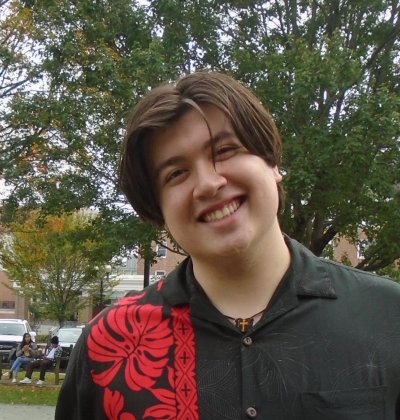
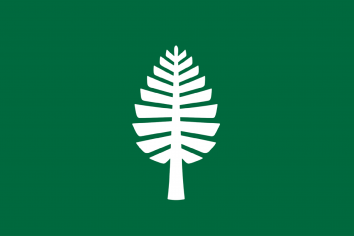
Gabriel Gilbert

You are here
Gabriel's D-Plan
What's a D-Plan?-
FallHanover, NH
Favorite Class: IndigistoryTaught by Gordon Henry, an Anishinaabe poet and author, this class taught me to explore Indigenous storytelling within digital contexts. I took this class with only seven other classmates, allowing us to really engage with films, comic books, and television shows in Indigenous languages or produced by Indigenous artists.
WinterHanover, NH
Favorite Class: Historical LinguisticsTaught by Timothy Pulju, this class taught me how to identify and understand how languages evolve over time and why. I analyzed and reconstructed fictional languages of imaginary nations in order to understand the link between language and culture, and ended up having such an appreciation for the complexity and beauty of language's place in history!
SpringMyrtle Beach, SC
Favorite Class: The End of the WorldTaught by Lindsay Whaley, this class let me discover a newfound love for ancient apocalyptic literature. We analyzed ancient texts and compared them to modern apocalypses, looking at the zombie apocalypse phenomenon and other apocalypses in pop culture and comparing them to the ancient tradition of writing apocalypses. Additionally, I learned the Greek alphabet and now I can even stumble through ancient Greek passages.
-
FallNew Orleans, LA
Favorite Class: Native American Literature and the LawTaught and organized by David Peterson, this class let me get into the shoes of a real linguist as we did fieldwork (virtually!!) with the Zophei language. I learned how to describe a never-before-learned language's phonology (sound system), how to characterize its grammar and words, and ultimately got to present my research to experts in the language family around the world in a workshop at the end of the term!
WinterHanover, NH
Favorite Class: Native American Literature and the LawTaught by N. Bruce Duthu, this class taught me how Native literature can provide lens by which to evaluate, critique, and ultimately revise Federal Indian Law. During this class, I read works by Native authors like Tommy Orange and Louise Erdrich '76 alongside the opinions of definitive case opinions in American law and explained how literature can be a catalyst for Indigenous sovereignty.
SpringMyrtle Beach, SC
Favorite Class: Undergraduate ResearchSupervised by N. Bruce Duthu, I spent this off-term performing research after being awarded a Sophomore Research Scholarship to study contemporary Hawaiian cultural and linguistic revitalization. I studied 19th-century newspapers and contemporary Hawaiian texts in order to understand how Hawaiian language revitalization both past and present has advanced and continues to enable a contemporary bodied Hawaiian politic of sovereignty.
SummerHanover, NH
Favorite Class: MorphologyTaught by Laura McPherson, this class taught me about how languages create meaning through words. During this class, I learned how to analyze different languages' morphological processes and compare different approaches within the field as to morphological structures.
-
FallHanover, NH
Favorite Class: Indian Country TodayTaught by N. Bruce Duthu, this class offered me a glimpse into the lived realities of Native people in Indian Country Today. I learned about the economic, social, cultural, and historical roots for the struggles of Indigenous people today within the United States, and was able to write about the contemporary battle for Native Hawaiian visibility and Hawaiian sovereignty.
WinterHilo, HI
Favorite Class: Language DocumentationTaught by Laura McPherson, this class taught me how to engage in language documentation and how, as a linguist, we can put our skills to use to help communities seeking to document and revitalize their languages. I worked on the Satawalese language, spoken on the island of Satawal in the Federated States of Micronesia. Ultimately, my team created two dictionaries - one in English, one in Hawaiian, a website, and several materials that focused on the Satawalese tradition of wayfinding and non-instrumental ocean navigation.
SpringHanover, NH
Favorite Class: Sound RelationsTaught by Charles Eastman fellow Sunaina Kale, this class taught me about the role of sound in delineating, conceiving, and comprehending relations between people and the land in Indigenous musical traditions. Over the course of the class, we discussed Indigenous musicians, listened to music from Native peoples around the world, heard from masterful Indigenous musicians, and ultimately presented a project that creatively analyzed a song of our choice. My project focused on the song "Ask Yourself" by Foster the People, and I wrote a poem that integrated aspects of Indigenous languages and worldviews to answer questions posed by the song.
SummerHanover, NH
Favorite Class: Honors Thesis ResearchThis term, I formally began the research process for my upcoming honors thesis in the Linguistics department on Hawaiian semantics! While living in Hanover, I also began working as a Senior Fellow with the Admissions department—a position I will be holding for the entirety of my last year at Dartmouth.

21Winter, or Why Skiing Rocks
After almost a year off-campus, I came back to campus committed to the winter experience and I am simply loving it.
Breaking It Down: Picking Classes at Dartmouth
Picking classes at Dartmouth is a one-of-a-kind experience. Where does one start at a school with so many departments and an army of classes to boot? Let's break it down.
- No. 1
Interests
My interests are easily one of the driving factors behind any course decision. To find classes that simply sound interesting, I tend to start with the academic departments I've come to know and love. The course catalog always has a few classes that, from the onset, sound like they touch on something fascinating. Your interests are your passions: use them! Even if it's a harder class, prior knowledge and love of certain subjects is a great compass to use when you're trying to find classes on your favorite things. Even if they're challenging, rising to the challenge is something we do for the things we love -- no better motivation to study than self-motivation.
None of the classes I've selected based off their course title, surprisingly, have ended up anything less than fantastic. I either have good luck or Dartmouth is good at titles -- either way, it never hurts to have a class you're actively excited for as part of your term. Dartmouth students typically take three classes per term, which gives you a lot of flexibility in choosing classes. For myself, I actually picked all three of the classes I took during my freshman fall based on my interest alone; I didn't let my prospective major or anything else get in my way, and I ended up finding the departments I want to major in instantaneously. Be spontaneous!
- No. 2
Major
By the time you get to campus, it's very likely that you'll have a major in mind. That's awesome! At Dartmouth, you don't have to declare a major until the end of the your fifth term, which gives you plenty of time to explore based off of your interests, or do what's tried and true and take a class in the major you had already looked at prior to becoming a Dartmouth student or simply a field you've dreamed of taking classes in forever. Regardless, after my first couple terms, my major was a constant consideration; even though I knew, as a freshman, that I didn't need to declare my major until later, I wanted to work steadily through the classes that would later constitute my major and I'm really happy that I did.
Every major (and minor!) at Dartmouth has a different set of requirements, and some majors might have more prerequisite classes (we just call them 'prereqs') that you need to take before you can start taking classes that apply to the major. Often, Dartmouth students take their prereq classes early on so as to be able to jump on their major classes as soon as possible. Always a great consideration to make!
- No. 3
Distributives
If you've been keeping up with my blogs, or honestly if you've read anything about Dartmouth, you're probably intimately familiar with the notion of the liberal arts, or about the flexibility involved and the exploration encouraged. Dartmouth has a very open curriculum, and the way that the school encourages you to try new things is through the use of distributive requirements. Basically, distributive requirements are "types" of classes, and to fulfill your degree at Dartmouth, you need to fulfill every distributive requirement. Distributives range from classes tackling quantitative and deductive science (QDS), international or comparative study (INT), literature (LIT), or art (ART).
If you're anything like me, something like QDS can sound pretty intimidating; I have never once shied away from even suggesting the idea that I could be a STEM person. But the best part about Dartmouth is how easy it can be to fulfill these distributives even in subjects that are pretty removed from your interests. I ended up fulfilling my QDS distributive through my first linguistics class -- why? Linguistics involves a lot of data analysis and deductive science, so even though it isn't a math course, it counts! And ART? I took a creative writing class! Dartmouth is flexible, and more than anything, the distributives encourage you to make your own Dartmouth experience, and though I might gripe, I've learned a fascinating amount simply from trying to fulfill my distributives through classes that sound interesting.

Back to Campus: Hanover, Take Two
This winter, I will resume classes on campus again -- a little older, a little wiser, and yet no less excited to fall countless times while attempting to ice skate. Upper Valley winter, here I come!
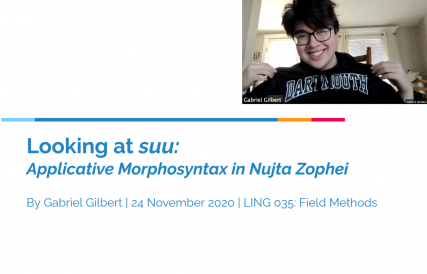
New Horizonsː Field Research, But Make It Virtual
Over the course of my sophomore fall, I had the opportunity to take a linguistics field methods class. During the course, we had the one-of-a-kind opportunity to study the Zophei language from Myanmar!
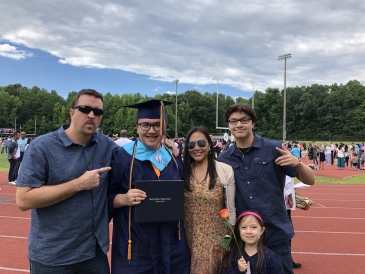
The Extracurricular You Didn't Realize Countsǃ
As a high schooler, you're busy. But not all of that time is necessarily spent on extracurricular activities that fall under your typical umbrella. Family responsibilities, especially during COVID-19, count just as much on your application.

Zoom, Stop Making Me Miss My Campus
But at the end of the day, when people ask me what my favorite Dartmouth memories are, I'm always thinking about the place. Ice skating, pink sunsets, riverbanks, or canoeing? That's my highlight reel.

3 Things I Wish I'd Known As a Prospective Student
Over the past year, I've talked a lot with prospective students. Picking a college is a big deal, but if I knew what I do now, I'd still pick Dartmouth a dozen times over.

Thursday Night Trivia!
Turns out breakout rooms can be a force for good—trivia over Zoom, anybody?
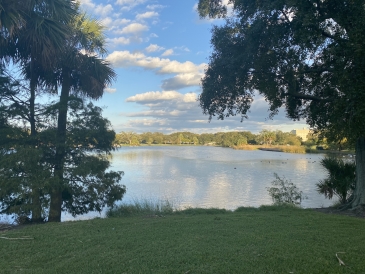
Dartmouth and the Art of Pacing
Not the walking around a room kind—more like the leave-room-for-chill-vibes-in-your-life kind.
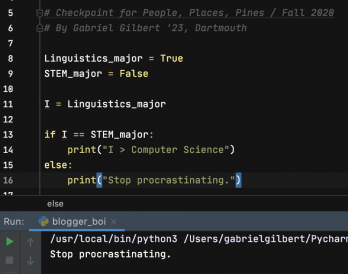
Social Sciences Major vs. STEM: Take 1
My name is Gabe, and I am not a STEM major. But for Fall 2020, I am a STEM student: I am taking Computer Science 001.

